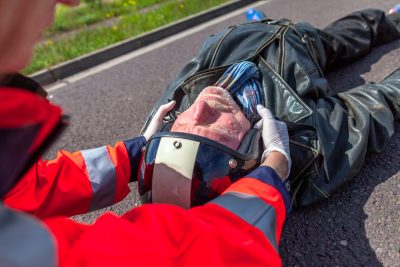Georgia Motorcycle Accident Lawyer

If you have been injured in a motorcycle accident, or if your loved one has been fatally or catastrophically wounded, the experienced Georgia motorcycle accident lawyers at Scholle Law are here to help. Our attorneys know how fun motorcycles are – and we also understand the dismissive attitude other drivers often take toward bikers.
We have represented motorcycle injury victims for over 25 years, and our results speak for themselves. Give us a call at (866) 592-1296 or contact us online for a free, no-obligation consultation with a motorcycle accident lawyer near you today.
Common Motorcycle Accident Injuries
Motorcyclists are 29 times more likely than drivers to be killed in an accident and four times more likely to be injured, according to the National Highway Traffic Safety Administration (NHTSA). In fact, motorcyclists account for about 15 percent of all traffic fatalities in 2019.
Because riding a motorcycle does not afford the same kind of protection as driving or riding in an enclosed vehicle, motorcyclists may suffer a wide range of injuries resulting from an accident, many of them serious or life-threatening.
The most common types of injuries motorcyclists may suffer in an accident include:
Traumatic Brain Injury
Motorcycle accidents are a leading cause of traumatic brain injuries (TBI), ranging from concussions to severe hemorrhaging and permanent brain damage. Wearing a helmet reduces this risk significantly, but does not completely eliminate it.
Road Rash
Road rash refers to the severe abrasions and friction burns a fallen motorcyclist often suffers while skidding across asphalt or dirt. While “rash” makes this injury seem minor, road rash can have serious consequences, such as infections and, in severe cases, the need for skin grafts.
Broken Bones
Motorcycle accidents frequently cause fractures in the arms, legs, collarbones, hips, and other bones of the body.
Internal Injuries
The severe impact of a motorcycle crash can cause damage to internal organs as well. These injuries may not be apparent at first, but they can be serious or fatal if unattended. As such, you should always get checked by a physician after an accident, even if you feel okay.
Neck and Back Injuries
The impact of a motorcycle accident can also cause serious injuries to the neck, back, and spinal cord. This includes alignment problems, ruptured discs, fractures, and even temporary or permanent nerve damage.
Contusions
Even in places where the skin is not broken, you may suffer contusions (bruises) throughout your body – places under the skin where the blood vessels break, causing painful “black-and-blue” marks.
Soft Tissue Damage
Soft tissue refers to muscles, ligaments, tendons, and other connective tissues throughout the body. After a motorcycle accident, these injuries can range from minor tendonitis to torn ligaments and muscles.
Common Causes of Motorcycle Accidents
Motorcycle accidents can occur due to a wide range of causes and factors, many of which constitute negligence on the part of the other driver. The most common causes of motorcycle accidents include:
Rear-End Motorcycle Accident
One of the most common scenarios for a motorcycle accident occurs when a vehicle driver hits the motorcyclist from behind. Quite often, this happens when the other vehicle is speeding or following too closely. Motorcycles can come to a complete stop very quickly, while larger vehicles require more time and a greater stopping distance.
Rear-end motorcycle accidents can be very dangerous for the cyclist because it is nearly impossible for the cyclist to maintain control of the motorcycle once hit from behind.
Distracted Driving
Distracted driving has become one of the main causes of accidents over the past decade. When a driver texts, emails, or talks on the phone while driving, it has the same effect as driving under the influence. Drivers may also be distracted by other passengers, reaching for a dropped object, or fiddling with the radio.
About 3,000 people a year die in distracted driving accidents, and motorcyclists can be particularly susceptible to injury or death when other motorists are driving while distracted.
Blind Spots
Every vehicle has “blind spots” – areas in the field of vision where the driver’s vision is partially obstructed. Some vehicles are now equipped with safety features to warn a motorist of blind spot activity, but not all. If a driver changes lanes without double-checking their blind spots, they could hit a motorcyclist who happens to be in that spot.
Poor Road Conditions
Less-than-optimal road conditions can be a recipe for disaster for motorcyclists. Wet or icy conditions reduce the friction of the tires on the road and make it easier to disrupt the biker’s balance. Likewise, these conditions can also cause other motorists to skid and possibly plow into the motorcyclists.
Potholes, debris, and loose gravel can also cause cyclists and other motorists to lose control of their vehicles. Poor visibility due to fog can be deadly for a motorcyclist if other drivers cannot see them.
Cutting Off
Motorists who are in a hurry or just being careless sometimes “cut off” other drivers, making a quick lane change or unexpected turn that forces the other driver to hit the brakes quickly or make evasive maneuvers to avoid a collision.
When a motorcyclist is cut off in this way, it can be extremely dangerous, not only because of the danger of the cyclist hitting the vehicle but also because any quick maneuvers could throw the motorcyclist off balance and cause them to skid out of control.
Driving Under the Influence
When a motorist drives under the influence of alcohol or drugs, that driver’s perception and cognitive abilities are both impaired. It also affects their ability to make reasonable decisions. When drunk drivers get around motorcyclists, things frequently do not end well.
Understanding Your Legal Rights After a Motorcycle Accident
Motorcycle accidents can be devastating, both physically and emotionally. When you’re involved in such an incident, it’s essential to know your legal rights. This knowledge can empower you to take the necessary steps to protect yourself and seek the compensation you deserve.
1. The Right to File a Personal Injury Claim
One of the primary rights you have after a motorcycle accident is the ability to file a personal injury claim. This claim allows you to seek compensation for medical expenses, lost wages, pain and suffering, and other damages you may have incurred as a result of the accident. The process of filing a “motorcycle accident claim” can be complex, which is why it’s crucial to consult with an experienced motorcycle accident lawyer to guide you through the process.
2. The Right to Representation by a Motorcycle Accident Attorney
After a motorcycle accident, you have the right to seek representation from a “motorcycle accident attorney.” These professionals specialize in understanding the nuances of motorcycle accident claims and can provide invaluable assistance in building a strong case. They can help gather evidence, negotiate with insurance companies, and represent you in court if necessary.
3. The Right to Compensation
If another party’s negligence caused your motorcycle accident, you have the right to seek compensation. This can cover medical bills, rehabilitation costs, lost income, and even non-economic damages like pain and suffering. An “experienced motorcycle accident lawyer” like those at Scholle Law can help you determine the full extent of your damages and ensure you receive the compensation you deserve.
4. The Right to Not Speak with the Other Party’s Insurance Company
After a motorcycle accident, you might be approached by the other party’s “insurance company” seeking a statement or trying to settle the claim quickly. Remember, you have the right to decline speaking with them without your motorcycle accident attorney present. Often, these insurance companies aim to minimize payouts, so having your lawyer handle communications can protect your interests.
5. The Right to a Fair Trial
If your motorcycle accident claim cannot be settled out of court, you have the right to a fair trial. This means presenting your case before a judge or jury, with the assistance of your motorcycle accident lawyer, to determine the compensation you’re entitled to.
6. The Right to Seek Punitive Damages
In some cases, the behavior of the at-fault party in a motorcycle accident might be so egregious that you can seek punitive damages. These are awarded not just to compensate the victim but to punish the wrongdoer and deter similar behavior in the future.
7. The Right to Repair or Replacement of Your Motorcycle
Apart from injuries, a motorcycle accident can result in significant damage to your vehicle. You have the right to seek compensation for repairs or the replacement value of your motorcycle.
8. The Right to Privacy
Your medical records, rehabilitation details, and other personal information related to the motorcycle accident are private. Only parties with a legitimate interest, like your “motorcycle accident lawyers” or the court, should access them.
9. The Right to Appeal
If you’re unsatisfied with the outcome of your motorcycle accident claim or trial, you have the right to appeal the decision. An appeal can be a complex process, and having a knowledgeable motorcycle accident attorney by your side can be invaluable.
10. The Right to Legal Counsel at No Upfront Cost
Many motorcycle accident lawyers, including those at Scholle Law, operate on a contingency fee basis. This means you don’t pay any legal fees unless you win your case. It ensures that everyone, regardless of their financial situation, has access to quality legal representation.
Understanding your rights after a motorcycle accident is crucial. From filing a personal injury claim to seeking representation from a qualified motorcycle accident attorney, knowing these rights can make a significant difference in the outcome of your case. If you or a loved one has been involved in a motorcycle accident, consult with an experienced motorcycle accident lawyer to ensure your rights are protected and you receive the compensation you deserve. Remember, firms like Scholle Law are here to support and guide you every step of the way.
Navigating Legal Avenues After a Georgia Motorcycle Accident
Motorcycle accidents, while unfortunate, are a reality many riders face. In the aftermath of such incidents, especially in Georgia, victims often find themselves overwhelmed with medical concerns, repair costs, and the looming question of legal recourse. Understanding the legal avenues available can be the difference between a swift resolution and prolonged distress.
1. The Initial Steps: Reporting and Documentation
Immediately after a motorcycle accident, it’s imperative to report the incident to the local police. This official documentation serves as a foundational piece of evidence for any subsequent “motorcycle accident injury claim” you may file. Ensure you obtain a copy of this report for your records.
2. Engaging a Motorcycle Accident Attorney
While it’s possible to navigate the aftermath of a motorcycle accident independently, the complexities of Georgia’s legal system make it advisable to consult a “motorcycle accident attorney.” Such professionals can offer insights specific to Georgia’s laws, ensuring you’re well-equipped to pursue your case. Another option is to seek guidance from “Georgia motorcycle accident attorneys” who are well-versed in local regulations and nuances.
3. Understanding Your Compensation Rights
Georgia law entitles motorcycle accident victims to compensation for various damages. Beyond “medical bills” and “lost wages,” you can claim compensation for emotional distress, pain and suffering, and in some cases, punitive damages meant to penalize egregiously negligent parties.
4. Dealing with Insurance Companies
Interactions with “insurance companies” can be daunting. They often employ tactics to minimize claim payouts. Armed with a “motorcycle accident lawyer,” especially one familiar with Georgia’s landscape like Scholle Law, you can ensure that your interests are robustly represented. It’s not uncommon for an “insurance company” to offer a low initial settlement, but with the expertise of a “motorcycle accident attorney,” you can negotiate for a fairer amount.
5. Exploring Out-of-Court Settlements
Not all “motorcycle accident cases” need to see the inside of a courtroom. Many are resolved through out-of-court settlements. These negotiations, often facilitated by your attorney, can lead to swift and satisfactory resolutions, saving both time and resources.
6. The Litigation Route
If negotiations falter, filing a “motorcycle accident lawsuit” becomes a viable option. This formal legal action, pursued in Georgia’s courts, seeks to obtain the compensation you rightfully deserve. It’s a step that underscores the importance of having a seasoned attorney by your side.
7. The Role of Expert Witnesses
In building a robust “motorcycle accident case,” expert testimonies can be invaluable. These can range from accident reconstruction specialists to medical professionals who can attest to the “severe injuries” sustained and their implications. Such “severe injuries” can have long-term consequences, making expert insights crucial.
8. Georgia’s Statute of Limitations
Time is of the essence. Georgia law stipulates a timeframe within which a motorcycle accident claim must be filed. Missing this window can jeopardize your right to legal recourse, emphasizing the need for prompt action.
9. Post-Trial Motions and Appeals
The end of a trial doesn’t necessarily spell the end of a case. If the outcome is unfavorable, you have the right to file post-trial motions or even appeal the decision, further highlighting the need for adept legal representation.
10. The Emotional and Psychological Dimension
While the physical aftermath of a motorcycle wreck or crash is evident, the emotional and psychological toll can be profound. Georgia law recognizes this, allowing victims to seek compensation for emotional distress and psychological trauma.
The aftermath of a motorcycle accident in Georgia can be a labyrinth of medical, logistical, and lega challenges. However, with a clear understanding of the available legal avenues and the support of a competent “motorcycle accident lawyer,” such as those at Scholle Law, victims can navigate this challenging period with confidence, ensuring that justice is served and rightful compensation secured.
Contact a Georgia Motorcycle Accident Lawyer Today

From left: Attorneys Annette Malena, Charles Scholle,
and Todd I. Shugart
If you have been injured in a motorcycle accident or someone you love has been injured or killed in such an accident, it may be completely obvious to you who is at fault and who should pay. But just because it seems obvious to you, does not mean it will be easy to hold the other party accountable or that you will get the settlement you deserve.
Motorcycle accidents are complex cases that require the expertise of an experienced personal injury lawyer. At Scholle Law, our attorneys have decades of experience helping victims of motorbike accidents get the compensation they deserve.
Give us a call at (866) 592-1296 or contact us online for a free, no-obligation consultation with a Georgia motorcycle accident lawyer near you today.
How long do I have to file a motorcycle accident lawsuit?
In the State of Georgia, the statute of limitations for filing personal injury claims is two years. In the case of motorcycle accidents, that two-year window begins on the date of the accident itself.
That may seem like plenty of time to file a lawsuit, but bear in mind that motorcycle accidents can be complex cases that require time to gather evidence and documentation in preparation for filing a lawsuit. Not to mention, your medical bills and other out-of-pocket expenses will not wait two years to be paid. That two-year window goes faster than you may think, and once the statute of limitations is up, it is too late to seek compensation.
For that reason, we recommend contacting us as soon as possible after the accident happens to help prepare a solid case and stay well within the window of opportunity for filing the lawsuit.
How much does a motorcycle accident lawyer cost?
At Scholle Law Firm, we understand your motorcycle accident has already been extremely costly, so we believe there should be no up-front fee to hire a motorcycle accident lawyer. The final cost depends on many factors, including how complex your case is, whether we need to go to court, and how long it takes to settle your claim.
However, we never take a fee unless and until we win your case, so you will never have to pay up-front for a motorcycle accident lawyer. Additionally, the amount our clients receive in settlements minus the attorney fees is usually exponentially higher than if they simply accept the insurance company’s first settlement offer. So, in the end, the fee is infinitely worth it.
What if I was partially to blame for my motorcycle accident?
First and foremost, you are not alone. The truth is, there are relatively few personal injury cases involving motorcycles or other vehicles where one party is determined to be one hundred percent at fault.
Part of the process for determining settlements in personal injury cases is to assign fault as a percentage. For example, if you were distracted or speeding when another motorist drifted into your lane and sideswiped you, the other driver might be assigned 80 percent of the fault while you are assigned 20 percent. Scenarios like these are quite common in vehicle injury accident cases.
Second, and this is important: Being partly to blame for your accident does not mean you forfeit your right to receive a settlement. Being assigned a percentage of the fault may prompt the insurance company to negotiate for a reduced settlement based on that percentage, but it does not mean they do not have to pay. Even if you were partially to blame for your accident, that does not necessarily mean you are partially to blame for the injuries you incurred in that accident or that those injuries were not caused by someone else’s negligence.
It’s your attorney’s job to get deep into these details and to fight on your behalf so the insurance company or the defendant can’t play the “blame game” as an excuse to keep from paying you what you deserve.
Bottom line – don’t worry if you believe you were partly responsible for your motorcycle accident. It doesn’t exempt you from getting help and the evidence may show that you aren’t at fault as much you think.
What if a loved one died in a motorcycle accident?
If a family member has died in a motorcycle accident, you may be eligible for compensation through a wrongful death claim. The idea behind a wrongful death claim is to compensate those who relied on the deceased financially or emotionally and who will suffer direct loss as a result of the death.
Georgia law prioritizes who may be eligible to file a wrongful death lawsuit, starting with the spouse of the deceased, who may also file a claim on behalf of any children under 18. If there is no spouse and no children, the parents of the deceased may file the suit. Finally, the deceased’s estate representative may file a wrongful death claim and distribute the settlement among the next-of-kin.
As with personal injury lawsuits, a wrongful death lawsuit may seek economic and non-economic damages, including lost wages and benefits, medical costs, burial expenses, loss of companionship, etc.
Atlanta Car Accident Lawyer, Atlanta Wrongful Death Lawyer, Atlanta Motorcycle Accident Lawyer, Atlanta Truck Accident Lawyer


